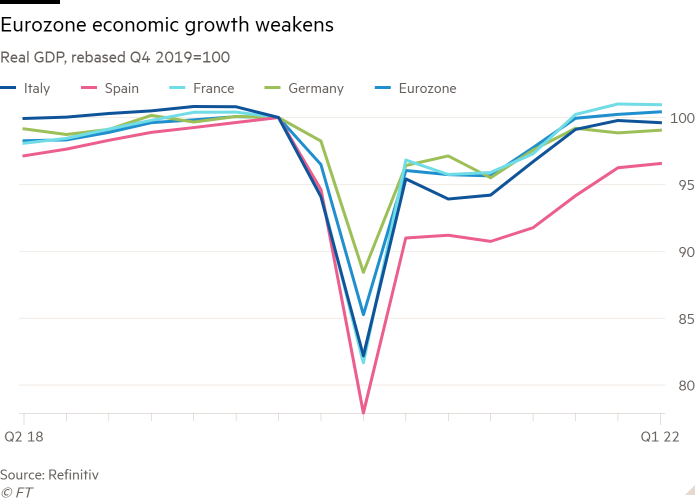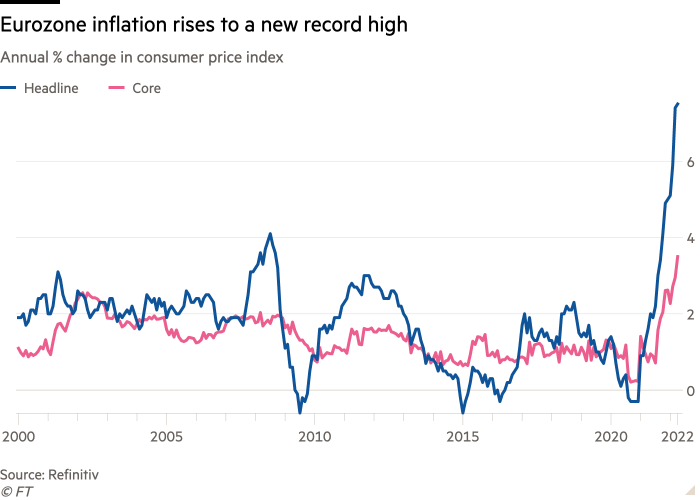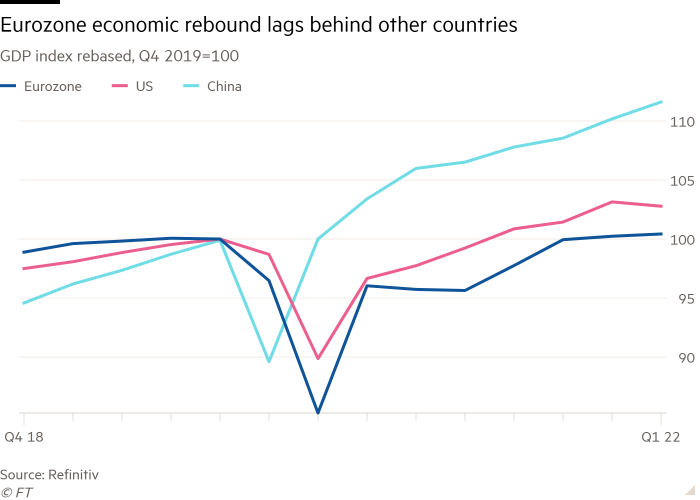Growth in the eurozone economy weakened during the first quarter while inflation inched up to a new record in April, raising the spectre of stagflation in a region blighted by soaring energy and food prices.
Gross domestic product in the 19 countries that share the euro grew 0.2 per cent in the first three months of the year, compared with 0.3 per cent in the previous quarter, Eurostat said on Friday. Economists polled by Reuters had on average forecast growth in the bloc to remain stable.
France’s economy stagnated in the first quarter while Italian output contracted. The Spanish economy also lost pace. Germany was the only one of the four biggest EU economies to beat expectations, as it posted meagre growth of 0.2 per cent from the previous three months.
Inflation in the eurozone was 7.5 per cent in the year to April, up from a record high of 7.4 per cent in the previous month, Eurostat said in a separate release. Energy prices rose 38 per cent, while unprocessed food prices jumped 9.2 per cent. Core inflation, excluding energy and fuel, increased to 3.5 per cent, up from 2.9 per cent.
The data show price pressures continue to build in the eurozone, keeping inflation well above the European Central Bank’s 2 per cent target and feeding calls for it to accelerate the reversal of ultra-loose monetary policy.
“For the ECB, the continued — albeit slowing — economic growth means that it is likely to act sooner rather than later,” said Bert Colijn, an economist at ING, forecasting that the central bank could raise interest rates in July if the economic outlook does not worsen, while adding “that’s a big if”.
Philip Lane, chief economist at the ECB, said on Friday there was “still a lot of momentum in the recovery”. He said the depreciation of the euro, which this week hit a new five-year low against the dollar, would push up the central bank’s next inflation forecasts due out in June. “Inflation is very high and that does carry its own risk of momentum,” he told Bloomberg.

Russia’s invasion of Ukraine has clouded the outlook for Europe’s economy. Economists fear an escalation of western sanctions on Moscow risks leading to shortages of oil and gas that would hit industry hard and send energy prices even higher, eroding household income and sapping consumer and business confidence. Russia has already cut off gas supplies to Poland and Bulgaria.
“We think eurozone GDP is likely to contract in the second quarter as fallout from the Ukraine war and surging energy prices take an increasing toll on households’ real incomes and consumer confidence as well as exacerbating supply-side problems,” said Andrew Kenningham, an economist at Capital Economics.
The eurozone’s 0.2 per cent first-quarter growth compares favourably with a 0.4 per cent contraction in the US economy, caused by a record-high trade imbalance and weaker inventory growth that offset higher spending by consumers and businesses in the period. But it lagged behind a 1.3 per cent expansion in China’s economy over the opening three months of the year.
Soaring consumer prices, continued pandemic restrictions and the fallout from the Ukraine war all took their toll on economic activity in the first three months of this year. Italy’s economy shrank 0.2 per cent, while Spanish growth slowed to 0.3 per cent. The strongest performers were Portugal and Austria, where output expanded by 2.6 and 2.5 per cent respectively.
The flatlining of French GDP in the first quarter marks a sharp slowdown from the upgraded 0.8 per cent growth rate in the final three months of last year. Economists had expected French first-quarter growth of 0.3 per cent.

The French national statistics office said output was hit by a 1.3 per cent fall in household spending, which offset the positive impact from higher investment, trade and inventories.
Germany’s 0.2 per cent rise in first-quarter GDP marked a rebound from a 0.3 per cent contraction in the previous quarter, meaning Europe’s largest economy avoided a technical recession, defined as two consecutive quarters of negative growth. Economists on average expected first-quarter German growth of 0.1 per cent.
The federal statistical agency said the expansion of the economy was “mainly due” to higher investment, while trade had a negative impact on growth. It said GDP was still 0.9 per cent below its pre-pandemic level in the final quarter of 2019 and warned that the Ukraine war was having “a growing impact on the short-term economic development”.

Italy’s 0.2 per cent drop in GDP partially reversed the 0.6 per cent expansion in the previous quarter and left overall output 0.4 per cent below pre-pandemic levels, according to the office for national statistics. The contraction was in line with analysts’ expectations.
Spanish quarterly GDP growth of 0.3 per cent was a marked slowdown from the 2.2 per cent expansion between the third and fourth quarter of last year. It also undershot the 0.5 per cent expansion forecast by economists polled by Reuters.
Nadia Calviño, Spain’s economy minister, slashed the government’s growth forecast for this year on Friday from 7 per cent to 4.3 per cent.


